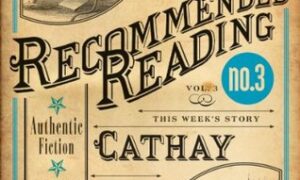 Mercy Snow by Tiffany Baker
Mercy Snow by Tiffany Baker
My rating: 3/5 cats



this book is a somewhat more women’s fiction-y counterpart to russell banks’ The Sweet Hereafter with a very slight sprinkling of magical realism for sparkle. like the banks, this begins with a school bus accident in the icy winter of a small northern town, and the way the accident’s aftershocks ripple through the community.
baker captures the small new england town mentality perfectly. in this case, it is a town completely reliant upon their sole industry of the local paper mill, and indebted to the family that owns it. this breeds feelings of gratitude and resentment both; a willingness to superstitiously guard the secrets of the mcallister family, but also a simmering discontent as the mill begins to fail and the future of the town is uncertain.
the bus accident serves to foment these repressed simmerings, and some of the emotional fallout is directed at the recent arrivals to the town; nineteen year old mercy snow, her older brother zeke, and their younger sister hannah, a wise and wild eight year old. they arrive in town with nothing to their name after the recent death of their mother, to find that their estranged father has also passed, and his house deep in the woods by the river has been abandoned and fallen into disrepair. they barely remember their father, except that he was a violent drunk, but the town knew him as an ill-tempered hermit who was connected in mysterious ways to one of the town’s darkest secrets. zeke is blamed for the bus crash after his car is found totaled near the scene of the accident, and he escapes into the woods until he is able to clear his name while the two girls stay in their father’s shack, enduring cold and hunger, with no one to turn to for help.
one of the other POV perspectives is june mcallister. she is a wonder of determined reinvention; having married well and put her poor florida childhood behind her as she readily conformed to the life of a new england mill owner’s wife and all that entails: the sewing circles, the well-appointed table, the sweater sets and the overseeing of all the other women in the town. on the surface, she is complete composed perfection, but inside, she is still struggling to live up to the life she has fallen into, and she will do anything to protect her family and their reputation. june is definitely the most interesting character in the book—the disparity between what she is and what she presents to the world is very nicely handled, and particularly the way other characters resent the parts of her she is struggling so hard to maintain because she thinks it is what is expected of her, when the sad reality it that she would probably have been more well-liked if she had been less artificially maintained. her relationship with her husband cal is another one of those toxic marriages reminiscent of The Silent Wife, and summed up perfectly here:
Her need to reinvent her life perfectly matched Cal’s need for someone to be wholly consumed by his world and his alone.
and for a while, this works for them, but the bus accident’s ripples have far-reaching consequences.
this book is very successful at presenting characters who are memorable and consequential, especially june. it is also very successful at revealing the petty understructure of smalltown life. as crime fiction, it is somewhat less successful.
there are a couple of things i don’t understand at all. there is a piece of physical evidence that becomes THE big secret. and as characters learn about its existence, it is alternately the whispered threat, the vaulted secret, the ace in the hole. but all by itself, it doesn’t prove anything, so i don’t understand why so much emphasis is placed upon it. would it lead to questions? yes. are those questions easily handled by anyone needing to hide the truth? yes. same for the Thing That Was Witnessed. it doesn’t mean anything at all, not on a criminal level. socially awkward, yes, and had it come to light earlier, before nature had its way with the crime scene, maybe i could have been significant, but time has passed. it is not threatening. get better clues!
oh, and the ending…it was kind of Tess of the d’Urbervilles-y, so that was not my favorite. but there are a lot of good things about this book, even as it straddles the line between “interesting descriptions” and “occasionally purple”
She never told Cal about the encounter, and over the years she forgot all about it until Pruitt’s death and the subsequent arrival of his estranged children picked the skin off that wound and left it as exposed as the tattoos she sometimes glimpsed etched onto the mill worker’s backs—fiery, fanged creatures posed with wild eyes and claws drawn, yet trapped forever in the pale of human flesh.
but overall, i would say “yes” to someone looking for one of those “family stories set in bleak america” types of book.
read my book reviews on goodreads







